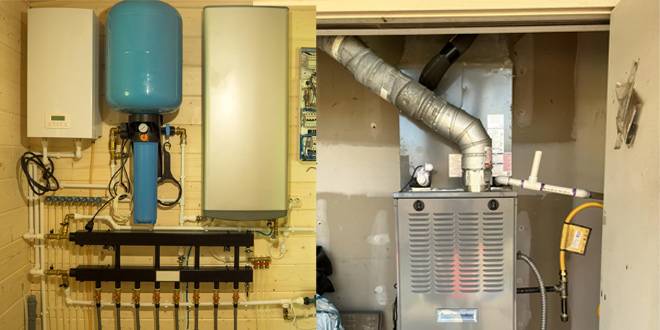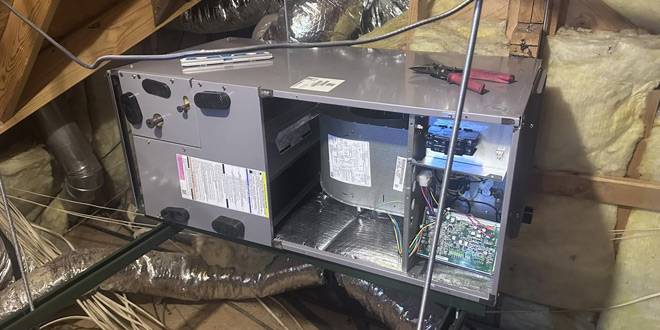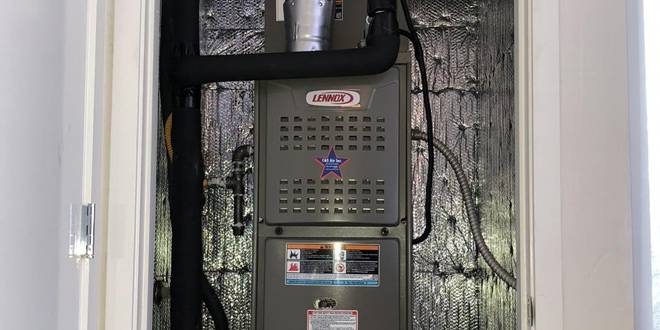
Winter is coming, and with it, the crucial decision: boiler or furnace? Both heat your home, but understanding their key differences empowers you to choose the champion that best suits your comfort and budget. Whether you’re a seasoned homeowner or a first-time buyer, navigating the heating system landscape can be confusing. This guide is your roadmap, offering a clear comparison of boilers and furnaces. By the end, you’ll be equipped to make an informed decision, ensuring your home remains a haven of warmth throughout the coldest months.
What is a Boiler? 🔥💧
A boiler is a heating system that operates by circulating hot water or steam through pipes to radiators, underfloor heating systems, or baseboard heaters throughout your home. This method ensures an even heat distribution in a clean and efficient manner. Boilers can be powered by natural gas, oil, propane, or electricity, and they come in various types to suit different needs and spaces. One of the main advantages of boilers is their ability to maintain humidity levels, providing a comfortable environment during dry winter.
Operating Principles
The operation of a boiler begins with heating water. This can be achieved through various fuel sources, including natural gas, oil, propane, or electricity. Once the water is heated, it’s either turned into steam or kept as hot water and moved through the piping system. The heat is then radiated into the rooms, providing comfort and warmth. Because this system uses water as the heat transfer medium, it’s often praised for its ability to maintain a consistent temperature without the dryness associated with forced-air heat.
Types of Boilers
Boilers can be classified into several types, each with its own set of advantages:
- Combi Boilers: These provide both heating and hot water without the need for a separate water tank, making them a space-saving solution for smaller homes.
- System Boilers: System boilers require a cylinder for storing hot water, but all the major components are built into the boiler, making installation easier.
- Conventional Boilers: Also known as traditional or regular boilers, these require both a cylinder and a tank. They’re suitable for homes with multiple bathrooms or higher hot water demand.
Advantages of Using a Boiler
- Even Heat Distribution: The heat from a boiler is radiated, which eliminates the cold spots often associated with other heating methods.
- Humidity Control: Boilers do not dry out the air as much as forced-air systems, making them ideal for those sensitive to dry air, such as individuals with respiratory conditions.
- Energy Efficiency: Modern boilers can be highly efficient, converting most of the fuel to direct heat. Some models even achieve efficiency ratings of up to 98%, significantly reducing energy consumption and heating costs.
What is a Furnace? 🔥🏠

Transitioning from the water-based heating systems of boilers, we now explore the domain of furnaces, a prevalent choice for residential heating in many homes. Furnaces work on a different principle, utilizing air as the medium to distribute warmth throughout the property. This segment will cover the fundamental operation of a furnace, its types, and the benefits it offers to homeowners.
Fundamental Operation
A furnace heats air by burning fuel, which can be natural gas, oil, propane, or electricity. This heated air is then forced through ducts that distribute the warm air throughout the home via vents or registers. This process is facilitated by a blower fan. The thermostat in your home monitors the temperature and signals the furnace to turn on or off, maintaining the desired comfort level.
Types of Furnaces
Furnaces are categorized mainly based on the type of fuel they use, and each type has its distinct advantages:
- Gas Furnaces: The most common type, gas furnaces, are known for their efficiency and cost-effectiveness, especially in areas where gas is relatively inexpensive.
- Oil Furnaces: In areas where natural gas is unavailable, oil furnaces offer an alternative. They require more maintenance but are effective in providing warmth.
- Electric Furnaces: With no need for natural gas or oil, electric furnaces are easier to install and maintain. They are ideal for smaller spaces or milder climates.
- Propane Furnaces: In rural areas where natural gas and oil are not readily available, propane furnaces serve as a viable heating solution. They are similar to gas furnaces in operation but use propane as fuel.
Benefits of Using a Furnace
- Rapid Heating: Furnaces can quickly heat a space, making them ideal for combating the sudden temperature drops common in many regions.
- Air Filtration: Many modern furnaces come equipped with advanced air filtration systems, improving indoor air quality by removing dust, allergens, and other particles.
- Cost-Effectiveness: Especially with gas furnaces, the cost per BTU (British Thermal Unit) is generally lower compared to electricity, making it a more economical option for heating.
- Adaptability: Furnaces can be easily integrated with existing ductwork and air conditioning systems, allowing for a unified HVAC system within the home.
Key Differences Between Boilers and Furnaces 🗝️🔄🏠
Choosing between a boiler and a furnace for your home heating solution involves understanding their key differences. This understanding is crucial not only for achieving optimal comfort but also for ensuring energy efficiency and cost-effectiveness. In this section, we will explore the fundamental distinctions between these two systems in terms of heating method, installation and maintenance, energy efficiency, and overall costs.
Heating Method
- Boilers use water as the heat transfer medium. They heat water to produce steam or hot water, which is then circulated through pipes to radiators or underfloor heating systems. This method provides even heat distribution and maintains humidity levels within the home.
- Furnaces, on the other hand, heat air directly and distribute this heated air through ductwork using a blower fan. This can lead to faster heating times but may result in uneven heat distribution and drier air during the heating season.
Installation and Maintenance Complexity
- Boiler systems generally require a more complex installation process due to the need for pipework for water circulation. However, they often have fewer moving parts, leading to potentially lower maintenance requirements and longer lifespans.
- Furnace installations tend to be less complex, especially if the home already has existing ductwork. Maintenance may be more frequent due to filters and blower motors, but it is typically straightforward.
Energy Efficiency and Environmental Impact
- Boilers can be extremely efficient, especially models that condense water vapor in the exhaust gases to recover its latent heat. They often achieve higher efficiency ratings and can be better for the environment due to lower emissions.
- Furnaces have also seen significant improvements in efficiency, especially with the development of high-efficiency models. However, the efficiency of a furnace can be somewhat reduced by heat loss in the ductwork.
Initial Investment and Long-term Costs
- The initial cost for installing a boiler is generally higher than that of a furnace, considering the pipework and radiator or underfloor heating system installations. However, the higher efficiency of boilers can lead to lower operational costs over time.
- Furnaces may have a lower upfront cost and are less expensive to install if the home already has ductwork. However, the cost of running a furnace, especially an electric one, can be higher in regions with high electricity prices.
Choosing the Right System for Your Home 🏠🔍🤔

Deciding between a boiler and a furnace for your home’s heating needs is a significant decision that affects not only the comfort of your living space but also your energy bills and maintenance requirements. This section will guide you through the critical factors to consider when choosing the right heating system, ensuring it aligns with your home’s specific needs and personal preferences. At C&S Air, we’re committed to helping you navigate this decision easily and confidently.
1. Assess Your Home’s Heating Needs
The size and layout of your home play a crucial role in determining the most suitable heating system. Boilers are excellent for homes that require even heating without the dryness associated with forced air. They are also ideal for homes with multiple levels or extensive floor plans due to their ability to maintain consistent temperatures across different areas. Furnaces offering quick and powerful heating might be more suitable for homes in regions with harsh winters where rapid temperature changes are common.
2. Consider Installation Requirements
If your home already has ductwork in place, installing a furnace may be more straightforward and cost-effective. Conversely, if you’re building a new home or undertaking a major renovation, incorporating a boiler system could provide more flexibility in terms of heating options, such as radiant floor heating. The presence of existing infrastructure can significantly influence the initial installation cost and complexity.
3. Evaluate Energy Efficiency and Operating Costs
Energy efficiency is a critical factor in choosing a heating system. Modern boilers and furnaces both offer high-efficiency models that can help reduce your energy consumption and lower your bills. However, the efficiency of your heating system can also be influenced by your local climate and the cost of fuel sources in your area. Consulting with a professional at C&S Air can help you understand the potential savings associated with each option.
4. Long-term Maintenance and Durability
Understanding the maintenance requirements and expected lifespan of your heating system is essential. Boilers generally have fewer moving parts, which can result in lower maintenance needs and a longer lifespan compared to furnaces. However, furnaces have significantly improved in durability and efficiency, making them a competitive option for many homeowners.
5. Professional Consultation
Choosing the right heating system is a decision that benefits from professional advice. At C&S Air, we offer comprehensive evaluations and in-depth system analysis to educate you on your options. Our goal is to ensure that you are fully informed about the advantages and considerations of each system, enabling you to make a decision that best fits your needs and budget.

Ready to Heat Your Home?
Embark on a journey towards optimal comfort and efficiency with C&S Air. Whether you prefer the gentle warmth of a boiler or the quick heat of a furnace, our experts are here to guide you to the perfect choice. 🏠💡 Let’s make your home a haven of warmth and comfort. Contact us today! 🔥👷♂️
